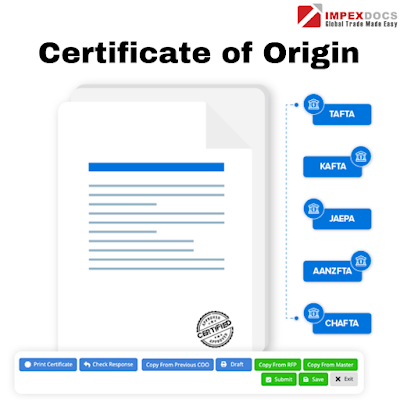International trade involves the movement of goods across borders, connecting businesses and consumers around the world. Certificates of Origin play a crucial role in this process by providing certified declarations of a product's origin. These documents are essential to ensure that trade flows smoothly and according to established regulations.
In this article, we'll explore the significance of Certificates of Origin in international trade, with a particular focus on the Australian Certificate of Origin, AANZFTA Certificate of Origin, and KAFTA Certificate of Origin. We'll explain how these certificates impact trade efficiency and why they are so important.
Understanding Certificates of Origin
To begin, let's clarify what Certificates of Origin are and why they matter in international trade. A Certificate of Origin is an official document that verifies the country where a product was manufactured. This declaration is crucial because it determines how the product is treated under various trade agreements and trade policies.
In the context of global trade, the country of origin has a significant impact on import duties, tariffs, and other trade regulations. Therefore, knowing the precise origin of a product is essential for customs authorities, importers, and exporters.
The Role of Certificates of Origin in Trade Agreements
Certificates of Origin are closely tied to international trade agreements. Trade agreements are pacts between countries that outline the terms and conditions of their trade relationships. These agreements often grant preferential treatment to products based on their origin, which is where Certificates of Origin come into play.
- Australian Certificate of Origin: Australia has its own Certificate of Origin, which is used to declare that a product originates in Australia. This document is essential when Australia is part of a trade agreement, as it helps businesses take advantage of the benefits offered in the agreement. For example, products that qualify as Australian-made may be subject to lower import duties when entering countries that have a trade deal with Australia.
- AANZFTA Certificate of Origin: The ASEAN-Australia-New Zealand Free Trade Agreement (AANZFTA) is an agreement that eliminates or reduces tariffs on goods traded between Australia, New Zealand, and the Association of Southeast Asian Nations (ASEAN). The AANZFTA Certificate of Origin is used to claim the benefits of this agreement. It allows exporters to prove the origin of their products, ensuring they meet the agreement's criteria for preferential treatment.
- KAFTA Certificate of Origin: The Korea-Australia Free Trade Agreement (KAFTA) is another trade agreement that offers favorable trade conditions for products from Australia and South Korea. The KAFTA Certificate of Origin is used by Australian exporters to certify that their products are of Australian origin. This certificate helps products qualify for lower tariffs and other trade benefits when entering the Korean market.
Impact on Trade Efficiency
So, how do these Certificates of Origin impact trade efficiency? Here are several key ways:
- Reduced Import Costs: Certificates of Origin help products qualify for preferential treatment, which can mean lower import duties and tariffs. This reduces the overall cost of importing goods, making them more competitive in international markets.
- Faster Customs Clearance: Knowing a product's origin allows customs authorities to process shipments more quickly and accurately. This reduces delays and ensures that goods reach their destination on time.
- Trade Transparency: Certificates of Origin enhance transparency in international trade. They provide a clear record of a product's origin, making it easier to track the flow of goods and ensure they meet the necessary regulations.
- Risk Mitigation: Using Certificates of Origin minimizes the risk of non-compliance with trade agreements. This, in turn, reduces the risk of disputes, fines, or other complications that can arise from incorrect declarations.
- Enhanced Supply Chain Management: Certificates of Origin enable businesses to better manage their supply chains. With accurate documentation, they can plan and execute their logistics more efficiently, reducing costs and improving overall supply chain performance.
Conclusion
In the complex world of international trade, Certificates of Origin are a vital tool that enhances efficiency, transparency, and compliance. Whether it's the Australian Certificate of Origin, AANZFTA Certificate of Origin, or KAFTA Certificate of Origin, these documents help businesses navigate the intricacies of trade agreements and regulations. By proving the origin of products, they reduce import costs, expedite customs clearance, and contribute to the smooth operation of global supply chains. In a globalized economy, the impact of Certificates of Origin on trade efficiency cannot be overstated.

Comments
Post a Comment